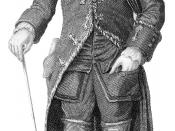The Philosophical Dictionary by Voltaire
The Enlightenment and the values it promoted are really nothing less than the infant version of twenty first century America. Its emphasis on reason, freedom of speech, religion, and assembly, and its desire to secularize government all appear in the Bill of Rights and represent the core beliefs which have been shaping U.S. culture for over two hundred years. Voltaire, a leader among the French philosophes, embodies much of the Enlightenment sentiment in his collection of essay entitled Philosophical Dictionary.
Voltaire was overwhelmingly concerned with religious and ethical issues. His belief that spirituality was a private matter simply didn't correspond with the norms of the day. Particularly unreceptive was the church which more times than not was the chief target of Voltaire's criticism. The church had long wielded great power in Europe, and the morals which it claimed to support were often overshadowed by an obsession with ensuring its own theological proclamations were honored.
Voltaire was quick to exploit this hypocrisy, and it inspired him to come up with his own philosophy on ethics and the role of the church.
Far from being an atheist which he considered a "bold and misguided scholar," Voltaire believed in an "eternal, supreme, intelligent being" (208) and thought religion was a good thing in a civilized society (56). However, what he hated was religious fanaticism, and it was something he saw all too often. He saw "religion, far from being a beneficial food... turn[ing] into poison in infected brains" (203). He saw men who backed "madness with murder" and men who killed "for love of god" (202). And he saw this happening all throughout the church. If this was the effect religion would have on society, if it would only create an "epidemic illness," then even atheism would...


